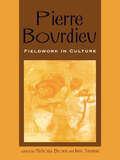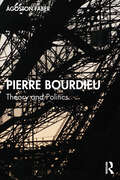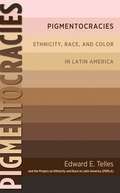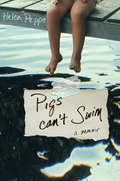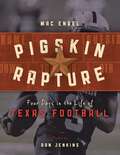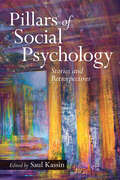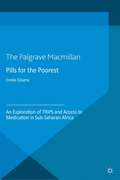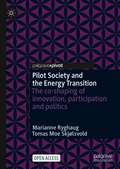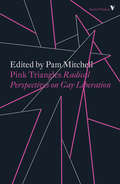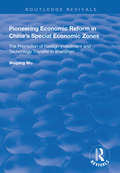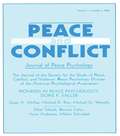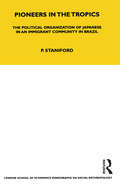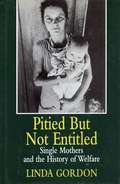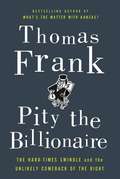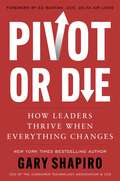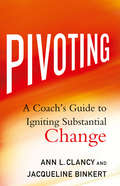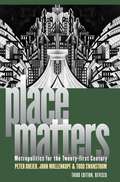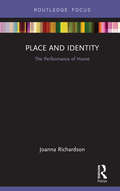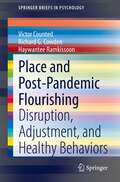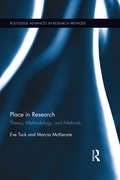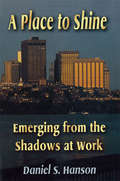- Table View
- List View
Pierre Bourdieu: Fieldwork in Culture (Culture and Education Series)
by Nicholas Brown Imre Szeman&“The wide range of subjects . . . provides a glimpse of the extent to which Bourdieu&’s theories of culture have gained widespread currency in the humanities.&” —David Eick, SubStance The work of Pierre Bourdieu, one of the most influential French intellectuals of the twentieth century, has had an enormous impact on research in fields as diverse as aesthetics, education, anthropology, and sociology. Pierre Bourdieu: Fieldwork in Culture is the first collection of essays to focus specifically on the contribution of Bourdieu&’s thought to the study of cultural production. Though Bourdieu&’s own work has illuminated diverse cultural phenomena, the essays in this volume extend to new cultural forms and to national situations outside France. Far from simply applying Bourdieu&’s concepts and theoretical tools to these new contexts, the essays in this volume consider both the possibility and limits of Bourdieu&’s sociology for the study of culture. &“Worth the attention of those who seek to become familiar with Bourdieu or to engage with a more well-rounded familiarity with the usefulness of his social theory.&” —Christopher Lindsay Turner, MFS Modern Fiction Studies &“This sparkling and unusually coherent collection of essays emphasizes the American reception and adaptation of Bourdieu&’s work. It shows how Bourdieu has been resisted and embraced and discusses how his terms and methods might be both used and modified by American academics. Theoretical reflections are productively complemented by empirical investigations of non-canonical and popular artistic expressions and by discussions of the position of women in Bourdieu&’s thought.&” —Marshall Brown, University of Washington
Pierre Bourdieu: Theory and Politics
by Ágoston FáberPierre Bourdieu is one of the most prominent figures in 20th-century sociology. His influence remains substantial even after his death in 2002, and his views and findings continue to divide sociologists to this day.This book examines the issue of Bourdieu’s so-called “political turn,” a significant topic in the French press and academic world. It explores whether the relationship between Pierre Bourdieu's increasingly visible political engagement from the mid-1990s and his earlier scientific work should be understood in terms of continuity or discontinuity.To investigate this specific issue, it is essential to discuss some basic concepts and significant insights of Bourdieu's social theory. The book also considers the robustness of Bourdieu’s theoretical framework and his criticisms of neoliberal capitalism from the perspective of Luc Boltanski’s competing pragmatic sociology.The book concludes that although Bourdieu, as a devoted left-wing intellectual, saw the possibility of resisting the neoliberal world order through mass mobilisation, inciting masses to collective action remains problematic within his sociological and anthropological framework. Through a systematic discussion of Bourdieu’s theory, the book offers insights into the relationship between science and politics and hopes to provide an opportunity for a deeper understanding of his work.
Pigmentocracies
by Edward TellesPigmentocracies--the fruit of the multiyear Project on Ethnicity and Race in Latin America (PERLA)--is a richly revealing analysis of contemporary attitudes toward ethnicity and race in Brazil, Colombia, Mexico, and Peru, four of Latin America's most populous nations. Based on extensive, original sociological and anthropological data generated by PERLA, this landmark study analyzes ethnoracial classification, inequality, and discrimination, as well as public opinion about Afro-descended and indigenous social movements and policies that foster greater social inclusiveness, all set within an ethnoracial history of each country. A once-in-a-generation examination of contemporary ethnicity, this book promises to contribute in significant ways to policymaking and public opinion in Latin America. Edward Telles, PERLA's principal investigator, explains that profound historical and political forces, including multiculturalism, have helped to shape the formation of ethnic identities and the nature of social relations within and across nations. One of Pigmentocracies's many important conclusions is that unequal social and economic status is at least as much a function of skin color as of ethnoracial identification. Investigators also found high rates of discrimination by color and ethnicity widely reported by both targets and witnesses. Still, substantial support across countries was found for multicultural-affirmative policies--a notable result given that in much of modern Latin America race and ethnicity have been downplayed or ignored as key factors despite their importance for earlier nation-building.
Pigs Can't Swim: A Memoir (A Merloyd Lawrence Book)
by Helen PeppeAn outrageous, hilarious, and touching memoir by the youngest of nine children in a hardscrabble, beyond-eccentric Maine family. With everything happening on Helen Peppe’s backwoods Maine farm, life was wild--and not just for the animals. Sibling rivalry, rock-bottom poverty, feral male chauvinism, sex in the hayloft: everything seemed--and was--out of control. In telling her wayward family tale, Peppe manages deadpan humor, an unerring eye for the absurd, and poignant compassion for her utterly overwhelmed parents. While her feisty resilience and candor will inevitably remind readers of Jeannette Walls or Mary Karr, Peppe's wry insight and moments of tenderness with family and animals are entirely her own. As Richard Hoffman, the author of Half the House: A Memoir puts it: "Pigs Can't Swim is an unruly, joyous troublemaker of a book. "
Pigskin Rapture: Four Days in the Life of Texas Football
by Mac EngelIn a magical four-day period in autumn 2015, both of Texas&’s NFL teams played at home on different days, a major high school rivalry was set for Friday night in West Texas, and a fierce regional rivalry came to the Cotton Bowl on Saturday afternoon. Pigskin Rapture: Four Days in the Life of Texas Football captures not just the action on the field but, perhaps more importantly, the pageantry off the field as well: cheerleaders, tailgate parties, booster club rallies, homecoming coronations, skybox parties, the bar scene, and more. Sports journalist Mac Engel and photographer Ron Jenkins and his assistant Michael Ainsworth took the ultimate football road trip: from a Texan&’s game in Houston, to Odessa to cover Permian High School&’s homecoming game, then to Dallas take in Texas v. Oklahoma in the Cotton Bowl, followed by every Texan&’s Sunday ritual, the Dallas Cowboys at home against perhaps the best quarterback in a generation. Along the way the Pigskin Rapture team captures the sights, sounds, and smells of a state smitten with football, from K-D&’s Barbecue in Midland, to the rarefied air of Cowboys owner Jerry Jones&’s private box in AT & T Stadium. Here, too, are the more subtle and occasionally unseen manifestations of Texas football culture, such as a homeless man who resides on a practice field in Houston; the cavernous remains of the Astrodome; the proud high school where Andrew Luck played; the Australian woman who made the Cowboy&’s cheerleading squad, having never watched an NFL game; and the hangover a West Texas town continues to endure nearly three decades following the publication of Friday Night Lights.With hundreds of stunning full-color photographs and meticulous reporting on the games and events, this book provides both die-hard and casual football fans everything they need to feel part of the action!
Pillars of Social Psychology: Stories and Retrospectives
by Saul KassinThis collection of first-person accounts from legendary social psychologists tells the stories behind the science and offers unique insight into the development of the field from the 1950s to the present. One pillar, the grandson of a slave, was inspired by Kenneth Clark. Yet when he entered his PhD program in the 1960s, he was told that race was not a variable for study. Other pillars faced first-hand a type of sexism that was hardly subtle, when women were not permitted into the faculty dining room. Still others have lived through a tremendous diversification of social psychology, not only in the United States but in Europe and Asia, that characterizes the field today. Together these stories, always witty and sometimes emotional, form a mosaic of the field as a whole – its legends, their theories and research, their relationships with one another, and their sense of where social psychology is headed.
Pills for the Poorest: An Exploration of TRIPS and Access to Medication in Sub-Saharan Africa (Palgrave Socio-Legal Studies)
by E. CloatreThe desperate need for a vast part of the global population to access better medicines in more certain ways is one of the biggest concerns of the modern era. Pills for the Poorest offers a new perspective on the much-debated issue of the links between intellectual property and access to medication. Using ethnographic case studies in Djibouti and Ghana, and insights from actor-network theory, it explores the ways in which TRIPs and pharmaceutical patents are translated in the daily practices of those who purchase, distribute, and use (or fail to use) medicines in sub-Saharan Africa. It suggests that focusing on routine practices and the material deployment of intellectual property significantly enriches our understanding of the complex dynamics that animate the field of access to medicines and helps relocate the role of law within those processes. It demonstrates how intellectual property affects access to medicines in ways that are often discreet, indirect and forgotten. By exploring these complex mechanisms, it seeks to ask questions about the modes of actions of pharmaceutical patents, but also, more generally, about the complexity of legal objects.
Pilot Society and the Energy Transition: The co-shaping of innovation, participation and politics
by Marianne Ryghaug Tomas Moe SkjølsvoldThis open access book examines the role of pilot and demonstration projects as crucial devices for conducting innovation in the context of the energy transition. Bridging literature from sustainability transitions and Science and Technology Studies (STS), it argues that such projects play a crucial role, not only in shaping future energy and mobility systems, but in transforming societies more broadly. Pilot projects constitute socio-technical configurations where imagined future realities are materialized. With this as a backdrop, the book explores pilot projects as political entities, focusing on questions of how they gain their legitimacy, which resources are mobilized in their production, and how they can serve as sites of public participation and the production of energy citizenship. The book argues that such projects too often have a narrow technology focus, and that this is a missed opportunity. The book concludes by critically discussing the potential roles of research and innovation policy in transforming how such projects are configured and conducted.
Pineapple Town: Hawaii
by Edward NorbeckThis title is part of UC Press's Voices Revived program, which commemorates University of California Press’s mission to seek out and cultivate the brightest minds and give them voice, reach, and impact. Drawing on a backlist dating to 1893, Voices Revived makes high-quality, peer-reviewed scholarship accessible once again using print-on-demand technology. This title was originally published in 1959.
Pink Ribbons, Inc.: Breast Cancer and the Politics of Philanthropy
by Samantha King&“Samantha King explains how, beyond being an all-too-frequent and still-too-lethal disease for many women, breast cancer is a corporate dream come true.&” —Herizons &“Fascinating. King&’s deft and thoughtful interpretation of the pink ribbon phenomenon is an important wake-up call. Going against the grain, she takes a clear-eyed look at a trend that often seems to outshine the disease that put it on the map.&” —Women&’s Review of Books &“King&’s criticisms of breast-cancer philanthropy provide a new means of looking at one of our culture&’s most celebrated causes. For anyone who has ever squirreled away yogurt lids for the cause, Pink Ribbons, Inc. is food for thought.&” —Bitch &“A fascinating read for anyone whose life has been touched by breast cancer.&” —Curve &“Breast cancer advocacy is being transformed from meaningful civic participation into purchasing products. To understand the personal, social, and political costs, read this book.&” —Barbara Brenner, Executive Director of Breast Cancer Action In Pink Ribbons, Inc., Samantha King traces how breast cancer has been transformed from a stigmatized disease and individual tragedy to a market-driven industry of survivorship. Here, for the first time, King questions the effectiveness and legitimacy of privately funded efforts to stop the epidemic among American women. Highly revelatory-at times shocking-Pink Ribbons, Inc. challenges the commercialization of the breast cancer movement. Samantha King is associate professor of physical and health education and women&’s studies at Queen&’s University, in Kingston, Ontario
Pink Triangles: Radical Perspectives on Gay Liberation
by Pam Mitchell"To link socialism and lesbianism is to link the unpopular with the taboo"Though the interpretations of the interplay between sexism and capitalism, between the personal and the political, vary across this spectacularly wide ranging collection, each essay shares two fundamental premises. First, that the oppression of gays and lesbians is not an isolated case, and therefore their struggle is necessarily part of a larger movement for social liberation. And second, that the experience of gays and lesbians uphold the basic tenants of a foundational marxism, and that they are uniquely placed to contribute to a revitalization of marxist theory.
Pioneering Economic Reform in China's Special Economic Zones: The Promotion of Foreign Investment and Technology Transfer in Shenzhen (Routledge Revivals)
by Weiping WuFirst published in 1999, this volume assessed the economic situation of Shenzhen in Guangdong Province, China, including its trade connections with Hong Kong and foreign investments in the area. Designated as one of four Special Economic Zones (SEZ) as part of China’s domestic economic reform in 1979, Weiping Wu examines Shenzhen’s economic situation in the context of Hong Kong’s transition just two years prior to publication in 1997. Wu explores the developments in Shenzhen in local policy, labor costs, export performance, domestic linkages and complementarity with Hong Kong as a result of Hong Kong’s closer connection with the Shenzhen trade area. Shenzhen’s suitability can then be assessed in its role as an SEZ to experiment with and digest western technology and management techniques for inland China and as a buffer between China and the wider world.
Pioneers in Peace Psychology: Doris K. Miller: A Special Issue of Peace and Conflict: Journal of Peace Psychology
by Doris K. MillerFirst published in 2005. Routledge is an imprint of Taylor & Francis, an informa company.
Pioneers in the Tropics: The Political Organisation of Japanese in an Immigrant Community in Brazil (LSE Monographs on Social Anthropology #No. 45)
by Philip StanifordThis study of a substantial Japanese immigrant community in Brazil concentrates on its development of a political organization to cope with internal problems of co-operation and conflict and to deal with the outside world of Brazilian politicians and merchants. After many early troubles the immigrants developed pepper growing as a cash crop and now seem on the way to prosperity. The analysis, which makes use of the concept of network interaction, is of relevance to all interested in community migration and development of new rural settlements.
Pionierinnen der Psychiatrie in Frankreich und Deutschland: Sechs ausgewählte Fallstudien (Frauen in Philosophie und Wissenschaft. Women Philosophers and Scientists)
by Jana ProkopDurch die biographische Herangehensweise gewährt diese Publikation einen differenzierten und in seiner Form einzigartigen Blick auf den Werdegang ärztlicher Pionierinnen in Deutschland und Frankreich von 1870 bis 1945. Dargestellt werden die Lebensläufe von sechs Psychiaterinnen, diese sind eingebettet in eine vergleichende Psychiatriegeschichte beider Länder mit besonderem Augenmerk auf die Entwicklungen der Psychiatrie in Zeiten des Zweiten Weltkrieges. Informationen zum Hochschulzugang von Frauen, dem Medizinstudium der ersten Studentinnen, zu Forschung sowie weiblicher Berufstätigkeit von Ärztinnen in beiden Ländern runden das Werk ab.
Pitied But Not Entitled: Single Mothers and the History of Welfare, 1890-1935
by Linda GordonWhen Americans denounce "welfare", most are thinking of the program of aid for single mothers and their children--the only program of the Social Security Act to become stigmatized. In this book, Gordon uncovers the tangled roots of competing visions of welfare and shows that welfare reform can only work if it recognizes that single motherhood is an enduring aspect of contemporary life.
Pity the Billionaire: The Hard-Times Swindle and the Unlikely Comeback of the Right, 1st edition
by Thomas FrankFrom the bestselling author of What’s the Matter with Kansas?, this witty and highly provocative book asks a simple question: How is it possible that the disastrous collapse of the free market economy in 2008 could have heralded a popular revival—of the right? In Pity the Billionaire, a brilliant, funny, and disturbing tour de force, Thomas Frank analyzes the sleight of hand involved in the right’s resurgence—all the upside-down grievances that have transformed economic suffering into valentines for the rich and powerful. This great chronicler of American paradox dissects the contradictions at the heart of the country’s politics, and in this “dazzling” book once again shows himself as "one of the best left-wing writers America has produced" (The Guardian).
Pivot or Die: How Leaders Thrive When Everything Changes
by Gary ShapiroFrom Gary Shapiro, New York Times bestselling author and head of CES and the Consumer Technology Association, a manifesto for today’s top executives, entrepreneurs, and leaders: pivot or die.As CEO of the Consumer Technology Association ®, owner and producer of CES ®, Gary Shapiro has had a front row seat to the launch of nearly every recent major technology. He's seen tech companies rise and fall, and bankrupt entrepreneurs become billionaires. After more than four decades in the industry, he knows that leaders who make it in the tech world have one thing in common: they know how to pivot. Drawing upon detailed case studies, economic theory, and personal experience, Pivot or Die offers a behind-the-scenes look at the development of innovative technology and business strategies. Along the way, Shapiro offers a "pivot" framework for leaders in technology and beyond to stay flexible and agile:The startup pivot: how startups can shake up industries and maximize the advantage of new ideasThe forced pivot: adapting to the unforeseeable (or simply unforeseen) and meeting shifting consumer demandsThe failure pivot: why failure can deliver better lessons than success and how to take those lessons forwardThe success pivot: Beating the market by seizing opportunity and out-pivoting your competitorsIn laying out each of these pivots, Shapiro shares unique lessons on how leaders can change minds and mindsets and steer their organizations to success in an increasingly competitive environment.
Pivoting
by Jacqueline Binkert Ann L. ClancyChange is a necessary, though sometimes challenging part of staying relevant, being engaged and seeking ways to flourish in one's life. Coaching helps individuals develop coherent strategies for their life and work and to tap into their strengths and inspiration. Often our clients find themselves having to shift or transform their limiting belief systems or habits of mind and behavior to move them toward greater self-direction. How does such meaningful change occur? What role can coaches play to effectively lead our clients to new insights? To answer these questions, the authors set off on a scholar/practitioner journey of research, study, and first-hand experience to better comprehend the mystery and wonder of how clients actually make meaningful transitions. Their path of inquiry describes a new science of change about how pivotal moments in coaching occur and what coaches can do to help ignite substantial change. This book interweaves master coach stories, examples, tools, strategies, and research to inform and enlighten readers of the profound awakening human beings are experiencing to the power of individual choice. No longer constrained by the outdated Newtonian concepts of linear change and external control, individuals are now capable of self-organization by shifting their perceptions and choosing to leave patterns of limited thought and action. From their research, the authors found that coaches play a key facilitative role in helping unleash the capacities and power of these pivots. Readers are invited to reflect on their own experiences of insight and those of their clients and to focus on priming strategies they can use to inspire and support pivotal moments for others. The authors share a dynamic model for igniting substantial change which shows the interrelationship of three core processes that contribute to a person's readiness for a shift: beliefs, inner knowing, and memory.
Place Matters: Metropolitics For The Twenty-first Century
by Peter Dreier John Mollenkopf Todd SwanstromHow can the United States create the political will to address our major urban problems--poverty, unemployment, crime, traffic congestion, toxic pollution, education, energy consumption, and housing, among others? That's the basic question addressed by the new edition of this award-winning book. Thoroughly revised and updated for its third edition, Place Matters examines the major trends and problems shaping our cities and suburbs, explores a range of policy solutions to address them, and looks closely at the potential political coalitions needed to put the country's "urban crisis" back on the public agenda. The problem of rising inequality is at the center of Place Matters. During the past several decades, the standard of living for the American middle class has stagnated, the number of poor people has reached its highest level since the 1960s, and the super-rich have dramatically increased their share of the nation's wealth and income. At the same time, Americans have grown further apart in terms of where they live, work, and play. This trend--economic segregation--no longer simply reflects the racial segregation between white suburbs and minority cities. In cities and suburbs alike, poor, middle class, and wealthy Americans now live in separate geographic spaces. The authors have updated the case studies and examples used to illustrate the book's key themes, incorporated the latest Census data, and drawn on exit polls and other data to examine the voting patterns and outcomes of the 2012 elections. They have expanded their discussion of how American cities are influenced by and influence global economic and social forces and how American cities compare with their counterparts in other parts of the world. And they draw upon the latest research and case studies not only to examine the negative impacts of income inequality and economic segregation, but also assess the efforts that civic and community groups, unions, business, and government are making to tackle them. Fully up to date and far richer and more provocative, this new version surpasses its previous editions and will continue to be an essential volume for all who study urban politics and care about our cities.
Place and Belonging in America
by David JacobsonHow did the American people come to develop a moral association with this land, such that their very experience of nationhood was rooted in, and their republican virtues depended upon, that land? And what is happening now as the exclusivity of that moral linkage between people and land becomes ever more attenuated? In Place and Belonging in America, David Jacobson addresses the evolving relationship between geography and citizenship in the United States since the nation's origins.Americans have commonly assumed that only a people rooted in a bounded territory could safeguard republican virtues. But, as Jacobson argues, in the contemporary world of transnational identities, multiple loyalties, and permeable borders, the notion of a singular territorial identity has lost its resonance. The United States has come to represent a diverse quilt of cultures with varying ties to the land. These developments have transformed the character of American politics to one in which the courts take a much larger role in mediating civic life. An expanding web of legal rights enables individuals and groups to pursue their own cultural and social ends, in contrast to the civic republican practice of an active citizenry legislating its collective life. In the first part of his sweeping study, Jacobson considers the origins of the uniquely American sense of place, exploring such components as the Puritans and their religious vision of the New World; the early Republic and agrarian virtue as extolled in the writings of Thomas Jefferson; the nationalization of place during the Civil War; and the creation of post-Civil War monuments and, later, the national park system. The second part of Place and Belonging in America concerns the contemporary United States and its more complex interactions between space and citizenship. Here Jacobson looks at the multicultural landscape as represented by the 1991 act of Congress that changed the name of the Custer Battlefield National Monument to Little Bighorn Battlefield National Monument and the subsequent construction of a memorial honoring the Indian participants in the battle; the Vietnam Veterans Memorial; and the U.S. Holocaust Memorial Museum. He also reflects upon changing patterns of immigration and settlement. At once far-reaching and detailed, Place and Belonging in America offers a though-provoking new perspective on the myriad, often spiritual connections between territoriality, national identity, and civic culture.
Place and Identity: The Performance of Home (Routledge Focus on Housing and Philosophy)
by Joanna RichardsonThe UK is experiencing a housing crisis unlike any other. Homelessness is on the increase and more people are at the mercy of landlords due to unaffordable housing. Place and Identity: Home as Performance highlights that the meaning of home is not just found within the bricks and mortar; it is constructed from the network of place, space and identity and the negotiation of conflict between those – it is not a fixed space but a link with land, ancestry and culture. This book fuses philosophy and the study of home based on many years of extensive research. Richardson looks at how the notion of home, or perhaps the lack of it, can affect identity and in turn the British housing market. This book argues that the concept of ‘home’ and physical housing are intrinsically linked and that until government and wider society understand the importance of home in relation to housing, the crisis is only likely to get worse. This book will be essential reading for postgraduate students whose interest is in housing and social policy, as well as appealing to those working in the areas of implementing and changing policy within government and professional spaces.
Place and Post-Pandemic Flourishing: Disruption, Adjustment, and Healthy Behaviors (SpringerBriefs in Psychology)
by Haywantee Ramkissoon Victor Counted Richard G. CowdenThis book rekindles the well-known connection between people and place in the context of a global pandemic. The chapters are divided into two sections. In the first section, “Place Attachment During a Pandemic,” we review the nature of the COVID-19 pandemic and the extent of its impact on place attachment and human-environment interactions. We examine how restrictions in mobility and environmental changes can have a significant psychological burden on people who are dealing with the effect of place attachment disruption that arises during a pandemic. In the second section, “Adjusting to Place Attachment Disruption During and After a Pandemic,” we focus on adaptive processes and responses that could enable people to adjust positively to place attachment disruption. We conclude the book by discussing the potential for pro-environmental behavior to promote place attachment and flourishing in the aftermath of the COVID-19 pandemic by introducing an integrative framework of place flourishing and exploring its implications for theory, research, policy, and practice.
Place in Research: Theory, Methodology, and Methods (Routledge Advances in Research Methods #9)
by Eve Tuck Marcia McKenzieBridging environmental and Indigenous studies and drawing on critical geography, spatial theory, new materialist theory, and decolonizing theory, this dynamic volume examines the sometimes overlooked significance of place in social science research. There are often important divergences and even competing logics at work in these areas of research, some which may indeed be incommensurable. This volume explores how researchers around the globe are coming to terms - both theoretically and practically - with place in the context of settler colonialism, globalization, and environmental degradation. Tuck and McKenzie outline a trajectory of critical place inquiry that not only furthers empirical knowledge, but ethically imagines new possibilities for collaboration and action. Critical place inquiry can involve a range of research methodologies; this volume argues that what matters is how the chosen methodology engages conceptually with place in order to mobilize methods that enable data collection and analyses that address place explicitly and politically. Unlike other approaches that attempt to superficially tag on Indigenous concerns, decolonizing conceptualizations of land and place and Indigenous methods are central, not peripheral, to practices of critical place inquiry.
Place to Shine, A: Bringing Special Gifts To Light
by Arden Hills Daniel S HansonFirst published in 1996. Routledge is an imprint of Taylor & Francis, an informa company.
